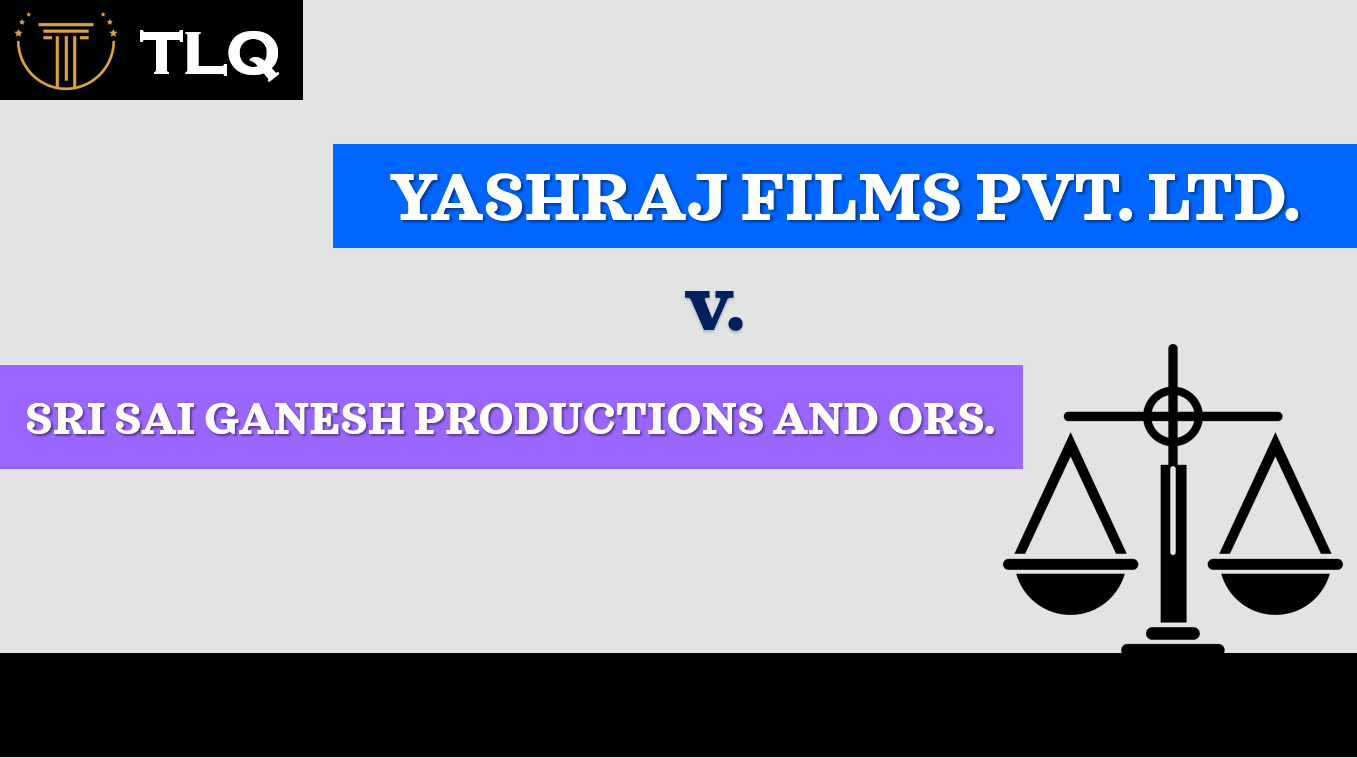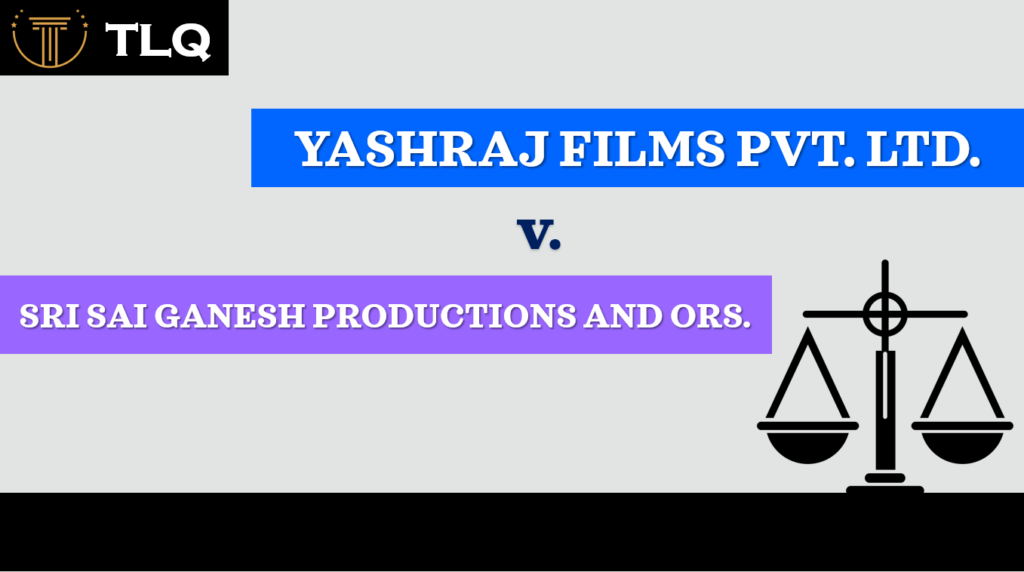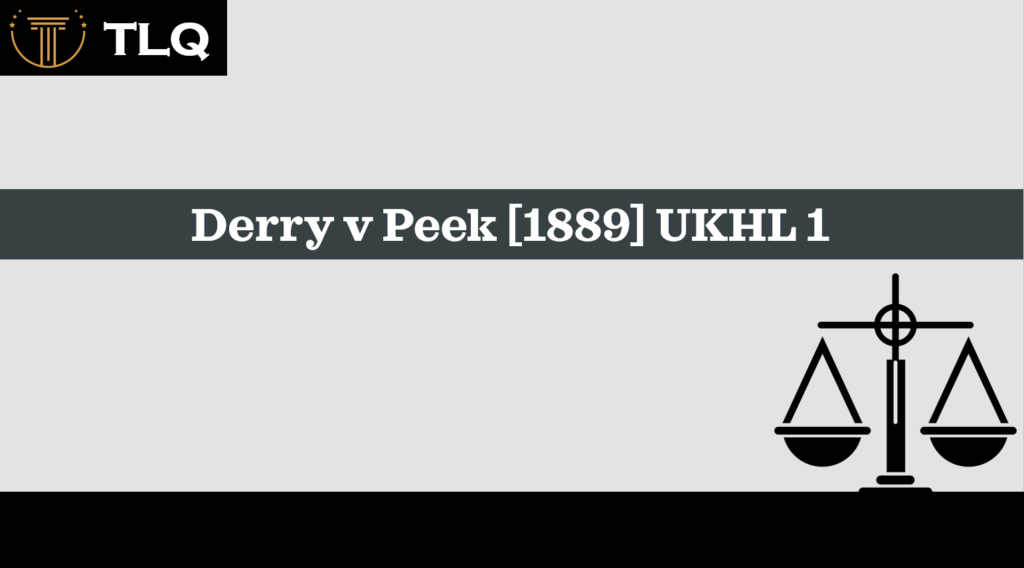Published On: 15th May, 2024

PETITIONER: YASHRAJ FILMS PVT. LTD
DEFENDANT: SRI SAI GANESH PRODUCTIONS
COURT: DELHI HIGH COURT
DATE OF JUDGEMENT: 8TH JULY, 2019
CITATION: AIR 2019 : DEL 1017
CORUM: HON’BLE MR. JUSTICE MANMOHAN
INTRODUCTION:
This is a civil suit that was instituted by Yashraj Films Pvt. Ltd for the copyright infringement of the Indian Bollywood movie “Band Baja Baarat” which was released by the Yashraj Films Pvt. Ltd. in the year 2010. Sri Sai Ganesh Production (referred to here as the Defendant) is a Telegu Production House that has produced a movie named “Jabardasth” which is the replica of the Indian Bollywood movie “Band Baja Baarat”. The Telugu movie was made without any permission from the original film producer. Yashraj Films Pvt. Ltd had to file a copyright infringement suit against the Director and the Distributor of the Telugu movie for infringing the rights of the original makers of the movie. The Delhi High Court passed a judgment in the year 2019 in favor of the Plaintiff i.e. Yashraj Films Pvt. Ltd.
FACTS:
The Indian Bollywood movie “Band Baja Baraat” was released in the year 2010 by a well-known production house in India i.e. Yashraj Films Pvt. Ltd in India and other several countries outside India. The production house Yashraj Films Pvt. Ltd i.e. the Plaintiff here in this matter had various copyrights in the original work of the movie including dialogue, theme, concept, plot, script music, etc. Yashraj Films Pvt. Ltd has announced through a public notice in Tamil and Telugu languages that it has not sold the copyrights of the movie to any third party and it has the exclusive and sole ownership over the movie.
The Telugu Production House “Sri Sai Ganesh Production” on the other hand intended to remake the film “Band Baja Baarat” which came to the knowledge of the Plaintiff in December 2011. Defendant No.1 here is the Producer of the Defendant Production House, Defendant No.2 here is the Distributor of the Defendant Production House and the Defendant No.3 here is the Director of the Defendant Production House. Yashraj Films Pvt. Ltd had sent two legal notices to cease and desist Defendant No.1 from making the remake of the film “Band Baja Baarat” in January 2012 and another legal notice followed by April 2012. The Telugu Production House “Sri Sai Ganesh Production” never responded for the same.
The Telugu Production House “Sri Sai Ganesh Production” has released a trailer of the movie which was the exact copy of the Indian Bollywood movie “Band Baja Baarat” and named it “Jabardasth”. Thereafter, Plaintiff issued the Third legal notice requesting the Telugu Production House the copy of the impugned movie and also the script which was not responded to by the Telugu Production House “Sri Sai Ganesh Production”. The Telugu movie “Jabardasth” was released in the year 22nd February 2013. The Defendant thereafter sold their rights to a Tamil Production House for the remake of the same movie i.e. “Jabardasth” in Tamil language which was to be named “Dum Dum Pee Pee” to be released in the year April 2013. These rights were sold to Defendant No.2 who is the Distributor of the Defendant Production House. The Plaintiff Production House had filed a suit for infringement of copyright against the Defendants of the Defendant Production House “Sri Sai Ganesh Production” for copying the plot, theme, and also the character sketch of the original Bollywood movie “Band Baja Baraat” to which the Defendant No. 3 acknowledged the plaintiff to be the owner of the copyright of the script, screenplay, dialogues and all other works which could be copyright of the Plaintiff’s Movie. The High Court at Delhi had granted an ex-parte interim injunction from restricting the Defendant Production House from releasing the movie in the public domain and for a rendition of accounts and damages dated 06th March 2013.
ISSUES:
- Can copyright subsist in a cinematograph film independent of the underlying works that it is comprised of?
- Can the expression ‘to make a copy of the film’ under Section-14(Section-14, 1957) of the Indian Copyright Act, 1957 mean making a physical copy of the film only? Is there a substantial and material similarity between the two films?
- Does the Delhi High Court have the jurisdiction to hear the present matter? (BananaIP, 2019)
ARGUMENTS ON BEHALF OF THE PETITIONER:
- The counsel on behalf of the Plaintiff contended that the storyline of the movie “Jabardasth” contains the plot of the original movie and the treatment as well as the expressions as well. The film “Jabardasth was blatantly copied from the original movie.
- The counsel on behalf of the Plaintiff contended that there were substantial and material similarities between both the movies in terms of theme, concept, plot, character sketches, story, script, form and expression, etc. which amounted to copyright infringement.
- The counsel on behalf of the Plaintiff contended that a viewer of the impugned movie who had also seen the plaintiff’s movie would have an unmistakable impression that the defendant’s movie was a copy and/or reproduction of the plaintiff’s movie.
- The counsel on behalf of the Plaintiff contended that the reviews received by the impugned film validated and reinforced the fact that the defendant’s film was a blatant copy of the plaintiff’s Film.
ARGUMENTS ON BEHALF OF THE DEFENDANT:
- The counsel on behalf of the Defendant contended that the High Court at Delhi had no jurisdiction to go through the matter as the movie was conceived, written, and directed in Hyderabad and no preparation of the movie including the post-production work was done in Delhi.
ANALYSIS OF THE ISSUES:
- In the realm of Indian Copyright law, a cinematograph film is seen in a wider aspect than underlying works. Underlying works refer to creative and original works of a movie such as scripts and dialogues under the literary works, songs under sound recordings, lyrics under musical works, etc. Individual copyright protection can be granted to each underlying work. The Court held that an entire cinematograph film is also entitled to be protected under the Indian Copyright Act, 1957 under Section- 2(d)(Section-2(d), 1957) and Section-13(2)(i) of the Indian Copyright Act, 1957 (Section-13(2)(i), 1957).
- The Delhi High Court held that the expression “to make a copy of the film” under Section-14(d)(i)(Section-14, 1957) of the Indian Copyright Act, 1957 is not only restricted to making physical copies of the movie but it also includes the idea-expression dichotomy and other intangible aspects in incorporating the original movie in the dubbed version. The Court was of the opinion that the Defendant Production House blatantly copied the fundamental, essential, and distinctive features of the plaintiff’s original work “Band Baja Baarat” which led to infringement.
- The Delhi High Court held that it has territorial jurisdiction to hear the matter as the impugned movie “Jabardasth” was also released in Delhi along with the rest of the country. (BananaIP, 2019)
REASONING:
The reasoning of this case likely revolves around the examination of the similarities between the two movies including the plot, theme, and character sketch of the original work of the movie “Band Baja Baarat”. The Delhi High Court determined that there exists an infringement of the copyright of the Plaintiff Production House. The Court was of the opinion that the impugned movie contains a substantial part of the original movie which forms the basis of a copyright infringement case. The Delhi High Court held the Defendant Production House guilty of copyright infringement and passed an order on behalf of the Plaintiff Production House from permanently restraining the Defendant Production House from violating and infringing the Copyright of the original work made by Yashraj Films Pvt. Ltd and also damages to be paid along with an interest of 18% p.a.
CONCLUSION:
The High Court of Delhi was of the opinion that the movie “Jabardasth” was blatantly copied from the original Bollywood movie “Band Baja Baarat”. The fundamentals, essentials, distinctive features and forms, and expressions were also copied infringing the right of the Plaintiff Production House. A decree was passed in favour of the Plaintiff Production House from permanently restraining the Defendants, their servants, employees, representatives, and agents from violating and infringing the copyrights of the Plaintiff Production House and also restraining from dubbing or releasing the original movie in Tamil and/or Telugu languages. Damages to the infringement shall also be paid to the Plaintiff Production House along with an interest of 18% p.a. The Delhi High Court had the jurisdiction to see the matter as the impugned movie was released in Delhi too. (Yash Raj Films Pvt Ltd vs Sri Sai Ganesh Productions & Ors, 2019)
References
BananaIP. (2019, October 21). CASE BRIEF: YRF V SRI SAI GANESH PRODUCTIONS. Retrieved from BananaIP.com: https://www.bananaip.com/ip-news-center/case-brief-copyright-infringement/
Section-13(2)(i). (1957). In Bare Act (p. 194). Universal LexisNexis.
Section-14. (1957). In Bare Act (pp. 195-197). Universal LexisNexis.
Section-2(d). (1957). In Bare Act (p. 187). Universal LexisNexis.
Yash Raj Films Pvt Ltd vs Sri Sai Ganesh Productions & Ors, CS(COMM) 1329/2016: AIR 2019: DEL 1017 (DELHI HIGH COURT July 8, 2019).



![Detailed Case Commentary of Joseph Shrine v. Union of India [2018] 11SCR770](https://thelegalquorum.com/wp-content/uploads/2024/11/DALL·E-2024-11-08-01.30.57-A-clear-refined-and-professional-image-on-the-topic-Marital-Rape_-Legal-Lacunae-and-Need-to-Reform.-The-image-shows-a-formal-courtroom-scene-with-1-1-1024x585.webp)

